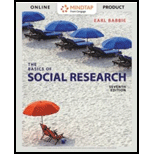
Introduction
What are the theoretical underpinnings of the study? That androgynous names reflect increasing feminism.
How are some of the key variables such as androgynous, racial, and gender segregation conceptualized and operationalized? Female children got androgynous names more often.
What data is this research based on? First names of babies from 1916-1989
Are there controlling variables?
What is the unit of analysis? First names
What type of analysis was done? Schelling residential segregation model
What did the authors find? The minimal increase in androgyny reflects a gender contamination effect that may be operating in a variety of other domains as well.
h. What are the strengths and weaknesses in this study? Strength - long duration of data gathering from most of the 20th century. Weakness - this study describes what happened, but does not explain it very well.
Explanation of Solution
Answer and explanation
(This question calls for a subjective answer. This is an example of an appropriate response.)
This study was made to determine whether increasingly androgynous naming represents an increase in the influence of feminism. One key variable was that female children got androgynous names more often than male children. Researchers used data on the first names of babies in the United States between 1916 and 1989. The unit of analysis was first names, and Schelling residential segregation model was used to analyze data. The authors found that the numbers of androgynous names is increasing very slowly, and this could represent gender contamination in a variety of domains. The strength of the study is the amount of data used, and one weakness is that it seems more descriptive than explanatory.
Want to see more full solutions like this?
Chapter 15 Solutions
BASICS OF SOCIAL RSRCH.(LL)-W/MINDT 6MON
- Explain how bilingualism, monolingualism, or trilingualism has affected you while using language in the Miami areaarrow_forwardDescribe the two models of language processingarrow_forward2. How would you compare the lives of poor people living in the low-income nations of the world with those in cities and rural areas of the United States? In what ways are their lives similar? In what ways are they different?arrow_forward
- discuss the critisism of functionslism theoryarrow_forwardHow have economic crises such as the Great Depression, the 2008–2009 recession, and the COVID-19 pandemic impacted families in both practical and emotional ways? How do these events continue to shape family life today? In what ways has the definition and structure of “family” evolved in the 21st century? How do these changes reflect broader shifts in societal values, gender roles, and legal recognition of diverse relationships? What are some of the major economic and social challenges facing families today, and how do these challenges differ across social class levels, particularly for working-class and middle-class families? How do you think the increasing visibility of same-sex families, domestic partnerships, and cohabitation without marriage will influence societal norms and policies around family in the coming decades? Given current trends, what do you envision family life will look like in the future—by 2030 or 2040? How might factors like technology, economic instability,…arrow_forwardYou have decided to study global wealth and poverty. How would you approach your study? What research methods would provide the best data for analysis? What might you find if you compared your research data with popular presentations—such as film and advertising—of everyday life in low- and middle-income countries?arrow_forward
- What are the PROs and CONs of the Guardian Mindset basd on mindsets in policing by Mike D'Antonio in a TEDx Talks presentation?arrow_forwardDiscuss one example of each of these… A time that someone gave you legitimate criticism that you could learn from. A time that someone gave unfair criticism which you should not be hurt by. A time that you criticized someone, perhaps accurately, but you delivered your criticism so harshly that the other person could not take it in. How could you have said it better?arrow_forwardprepare a written response which compares and contrast Zimbardo’s Theory of Individuation with Social Identity Theory.arrow_forward
 Social Psychology (10th Edition)SociologyISBN:9780134641287Author:Elliot Aronson, Timothy D. Wilson, Robin M. Akert, Samuel R. SommersPublisher:Pearson College Div
Social Psychology (10th Edition)SociologyISBN:9780134641287Author:Elliot Aronson, Timothy D. Wilson, Robin M. Akert, Samuel R. SommersPublisher:Pearson College Div Introduction to Sociology (Eleventh Edition)SociologyISBN:9780393639407Author:Deborah Carr, Anthony Giddens, Mitchell Duneier, Richard P. AppelbaumPublisher:W. W. Norton & Company
Introduction to Sociology (Eleventh Edition)SociologyISBN:9780393639407Author:Deborah Carr, Anthony Giddens, Mitchell Duneier, Richard P. AppelbaumPublisher:W. W. Norton & Company The Basics of Social Research (MindTap Course Lis...SociologyISBN:9781305503076Author:Earl R. BabbiePublisher:Cengage Learning
The Basics of Social Research (MindTap Course Lis...SociologyISBN:9781305503076Author:Earl R. BabbiePublisher:Cengage Learning Criminalistics: An Introduction to Forensic Scien...SociologyISBN:9780134477596Author:Saferstein, RichardPublisher:PEARSON
Criminalistics: An Introduction to Forensic Scien...SociologyISBN:9780134477596Author:Saferstein, RichardPublisher:PEARSON Sociology: A Down-to-Earth Approach (13th Edition)SociologyISBN:9780134205571Author:James M. HenslinPublisher:PEARSON
Sociology: A Down-to-Earth Approach (13th Edition)SociologyISBN:9780134205571Author:James M. HenslinPublisher:PEARSON Society: The Basics (14th Edition)SociologyISBN:9780134206325Author:John J. MacionisPublisher:PEARSON
Society: The Basics (14th Edition)SociologyISBN:9780134206325Author:John J. MacionisPublisher:PEARSON





